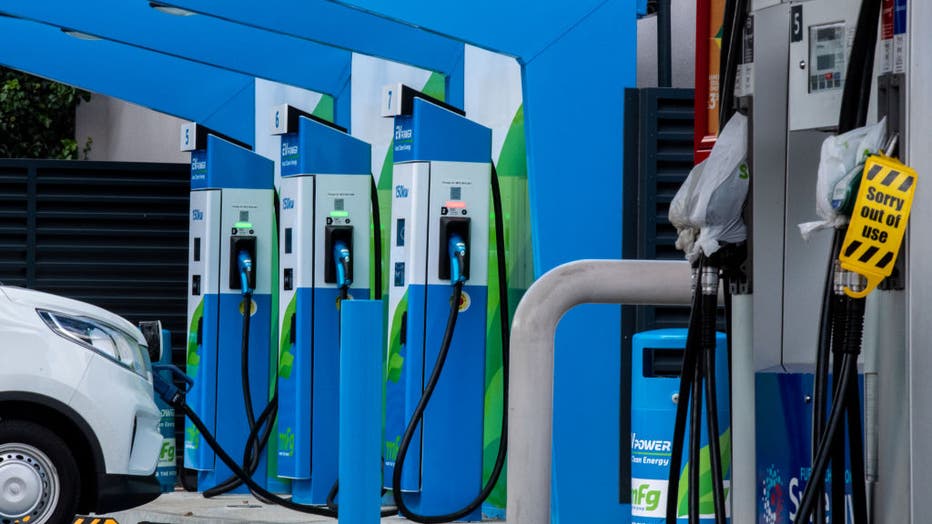REV Midwest: 5 governors commit to network for charging electric vehicles
Five Midwestern states signed on to an agreement Thursday aimed at providing more places for electric vehicles to recharge.
The project is called the Regional Electric Vehicle Midwest Coalition (REV Midwest) and the governors of Illinois, Indiana, Michigan, Minnesota and Wisconsin have agreed to forge a network of charging stations in the region.
Additionally, governors hope the agreement will create jobs, expand economic opportunity, promote energy independence, improve public health and result in cleaner air and water.

A motorist plugs his electric van to charge point at a Motor Fuel Group station whilst petrol and diesel pumps are closed on the Esso forecourt due to the ongoing fuel crisis on Sept. 2021 in London, England. (Photo by Chris J Ratcliffe/Getty Images)
"Today's REV Midwest partnership is a bipartisan effort to build the future of mobility and electrification and connect our communities," Michigan Gov. Gretchen Whitmer said in a news release. "Our partnership will enable the Midwest to lead on electric vehicle adoption, reduce carbon emissions, spur innovation, and create good-paying jobs."
Climate activists have been calling for the adaptation of electric vehicles (EVs) for years. Gasoline engines emit toxins that are not only harmful to living beings, but to the planet as well.
RELATED: UN report on climate change: 5 things to know
According to a statement from the office of Indiana Gov. Eric J. Holcomb, the transportation sector is a leading source air, climate, and water pollution.
Even so, many drivers have been reluctant to make the switch to EVs over concerns about their battery life and the availability of charging stations. REV Midwest could ease those concerns and expedite the transition to transportation that’s more friendly to the environment.
"The Midwest has the ingenuity and the drive to develop innovative solutions to curb climate change," said Minnesota Governor Tim Walz. "I am proud to work with my fellow Midwest governors to not only reduce pollution, but protect public health, create jobs, and increase consumer choice across the region."
This spring, President Joe Biden committed to cutting U.S. greenhouse gas emissions in half by 2030. According to Holcomb, the utility sector is estimated to need 105,000 new jobs to deploy EV charging infrastructure in that timeframe.
"I’m proud to partner with our neighboring states to put the Midwest region on the leading edge of providing the charging infrastructure needed to futureproof our transportation network and meet the demand as rapid adoption of electric vehicles continues," Holcomb said.
Much like the Green New Deal, the agreement is not legally binding. Any state may withdraw its commitment at any time through a written statement to other participating states.
But while part of the accord, members have pledged to do the following:
- Maintain a task force of senior leadership from each state.
- The task force will meet regularly to share updates and input on REV Midwest.
- The task force will regularly maintain information describing REV Midwest activities.
- The task force will identify barriers to private sector and publicly supported charging station development and work together on recommendations to remove these barriers.
- The task force will complete progress reports at regular intervals summarizing progress made towards the goals of REV Midwest.
- The participating states agree to support the task force and its responsibilities.
This story was reported from Atlanta.

